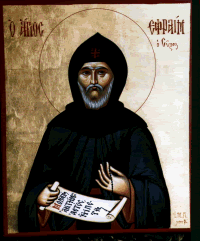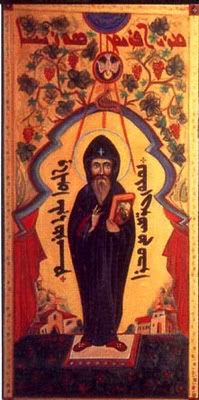 Today, June 9, we celebrate the feast day of Saint Ephrem (306-373), deacon and Doctor of the Church. Saint Ephrem, originally from Syria, wrote extensively in his native Syriac, close to the Aramaic language spoken by Christ. He penned an extensive collection of hymns, and is widely thought to be responsible for the practice of hymn-singing during the celebration of Mass. Saint Ephrem was a tireless defender of the faith, countering heresy with logic and faith. Many of his writings remain today, inspiring the modern-day faithful to reflection and commentary on the Passion of Christ, Our Blessed Mother, and other significant tenets of our faith.
Today, June 9, we celebrate the feast day of Saint Ephrem (306-373), deacon and Doctor of the Church. Saint Ephrem, originally from Syria, wrote extensively in his native Syriac, close to the Aramaic language spoken by Christ. He penned an extensive collection of hymns, and is widely thought to be responsible for the practice of hymn-singing during the celebration of Mass. Saint Ephrem was a tireless defender of the faith, countering heresy with logic and faith. Many of his writings remain today, inspiring the modern-day faithful to reflection and commentary on the Passion of Christ, Our Blessed Mother, and other significant tenets of our faith.Ephrem, recognized for his great knowledge and wisdom, and thoughtful consideration of Church doctrine and Holy Scripture, was appointed dean of the Nisibis school of theology. He worked closely with, and served as counsel, to three bishops, remaining in Nisibis until the occupation of the town by Persians in 363. At that point, he fled the city, taking up residence in a secluded cave close to the city of Edessa. There, Saint Ephrem continued his writing, embracing an austere life of fasting, prayer, and self-denial. Edessa, He subsisted on a little barley bread and a few vegetables each day, focusing on his writing. He is described, during this time period as “small in stature, bald, beardless, and with skin shriveled and dried up like a potsherd. His gown was all patches and the color of dirt. He is said to have wept much and never laughed.”
Saint Ephrem wrote countless homilies, sermons, commentaries on Scripture, and hymns. He confronted heresy throughout the Church, and his writings were quickly translated into every possible language of the day, spreading throughout the East and West, and greatly influencing Church doctrine and tradition. Saint Ephrem staunchly defended the singularity of Christ—the Divine and human perfectly united. He wrote on many topics, such as the love of God, morals, the Incarnation, the Eucharist, and original sin. His works were described as "a storehouse of treasures," and he was called -- "Harp of the Holy Spirit," "Doctor of the world," and "Pillar of the Church."
One such hymn, preserved today, follows:
From God Christ's deity came forth,
his manhood from humanity;
his priesthood from Melchizedek,
his royalty from David's tree:
praised be his Oneness.
He joined with guests at wedding feast,
yet in the wilderness did fast;
he taught within the temple's gates;
his people saw him die at last:
praised be his teaching.
The dissolute he did not scorn,
nor turn from those who were in sin;
he for the righteous did rejoice
but bade the fallen to come in:
praised be his mercy.
He did not disregard the sick;
to simple ones his word was given;
and he descended to the earth
and, his work done, went up to heaven:
praised be his coming.
Who then, my Lord, compares to you?
The Watcher slept, the Great was small,
the Pure baptized, the Life who died,
the King abased to honor all:
praised be your glory.
Saint Ephrem was raised to a deacon by Saint Basil near the end of his life. Such was his humility, however, he refused ordination to the priesthood, and felt unworthy to lead a congregation. Instead, he continued to preach and write from the vantage of his austere focus on the Lord.
Saint Ephrem wrote prolifically about Mary, Our Blessed Mother. He called devotion to her "the unlocking of the gates of the heavenly Jerusalem,” and wrote specifically of her perpetual virginity, her role as Theotokos (Mother of God), as her status as the first and perfect disciple, and of her many virtues given to her by Christ. Saint Ephrem wrote: "Thou and Thy Mother are the only ones who are in every way perfectly beautiful, for in Thee, O Lord, there is no stain; no stain also in Thy Mother."
Saint Ephrem delivered this beautiful homily on the Blessed Virgin Mary:
One can most appropriately attribute to Mary various names. She herself is the temple of the Son of God, who came forth from her in a natural condition that was truly different from the one He had when He entered into her. When he introduced Himself into her womb, He was without a body; He came forth from her clothed in a body.
Mary herself is the mystical new heaven in which the King of Kings dwelt as upon His throne. and from which He descended to the earth, bearing the aspect and resemblance of our earthly condition.
Mary herself is the fruitful vine exhaling its sweet fragrance; the fruit thereof, being of an entirely different nature, had to borrow His resemblance from the plant.
Mary herself is the wellspring that gushes out of the House of the Lord, the wellspring from which, for those who thirst, flow living waters. The one who will have tasted of it, or even there moistened his lips, will never thirst again.
But he is mistaken, the one who judges the day of our renewal comparable to that our first creation. In the beginning, in fact, the earth was created; today, the earth is renewed. In the beginning, because of Adam's sin, the earth was cursed in its production; but today the earth has truly recovered peace and security. In the beginning, because of the sin of our first parents, death made its way among men; but today, through Mary, we have passed over from death to life.
In the beginning, the serpent occupied the ears of Eve, and from there, his poison spread throughout the body. Today, Mary, having lent her ear to the Messenger, has received the pledge of eternal happiness. Thus, the ear that was the instrument of death, has become, at the same time, the instrument of life.
The writings of Saint Ephrem speak volumes about his passion for the truth of the Gospel, and his zeal for spreading the Word of God. We are blessed to have poems, hymns, prayers, and writings today, penned nearly 2 centuries ago, reminding us not only of the constancy of the love of the Lord, but of the long-standing traditions and teachings of the Church. As we read the writings of Saint Ephrem, we pray for his zeal for the Lord, and the future of His Church on earth.
Before his death, Saint Ephrem reflected on his life, writing in his testament: "There grew a vine-shoot on my tongue: and increased and reached unto heaven, And it yielded fruit without measure: leaves likewise without number. It spread, it stretched wide, it bore fruit: all creation drew near, And the more they were that gathered: the more its clusters abounded. These clusters were the Homilies; and these leaves the Hymns. God was the giver of them: glory to Him for His grace! For He gave to me of His good pleasure: from the storehouse of His treasures."
Selected Prayers, written by Saint Ephrem:
Prayer in Honor of Christ's Passion
I give you glory, O Christ, because you, the Only-begotten, the Lord of all, underwent the death of the Cross to free my sinful soul from the bonds of sin. What shall I give to you, O Lord, in return for all this kindness?
Glory to you, O Lord, for your love, for your mercy, for your patience.
Glory to you, for forgiving us all our sins, for coming to save our souls, for your incarnation in the Virgin's womb.
Glory to you, for your bonds, for receiving the cut of the lash, for accepting mockery.
Glory to you, for your crucifixion, for your burial, for your resurrection.
Glory to you, for your resurrection, for being preached to men, for being taken up heaven.
Glory to you who sit at the Father's right hand and will return in glory.
Glory to you for willing that the sinner be saved through your great mercy and compassion.
Prayer for Strength in Weakness
Lord Jesus Christ, King of kings, you have power over life and death. You know even things that are uncertain and obscure, and our very thoughts and feelings are not hidden from you. Cleanse me from my secret faults, and I have done wrong and you saw it. You know how weak I am, both in soul and in body. Give me strength, O Lord, in my frailty and sustain me in my sufferings. Grant me a prudent judgment, dear Lord, and let me always be mindful of your blessings. Let me retain until the end your grace that has protected me till now.
Prayer of Saint Ephrem
O Lord and Master of my life, keep from me the spirit of indifference and discouragement, lust of power and idle chatter.
Instead, grant to me, Your servant, the spirit of wholeness of being, humble-mindedness, patience, and love.
O Lord and King, grant me the grace to be aware of my sins and not to judge my brother; for You are blessed now and ever and forever. Amen.
Prayer to the Blessed Mother
O Virgin,
most pure,
wholly unspotted,
O Mary,
Mother of God,
Queen of the universe,
you are above all the saints,
the hope of the elect
and the joy of all the blessed.
It is you who have reconciled us with God.
You are the only refuge of sinners
and the safe harbor of those who are shipwrecked.
You are the consolation of the world,
the ransom of captives,
the health of the weak,
the joy of the afflicted,
and the salvation of all.
We have recourse to you,
and we beseech you to have pity on us.
Amen!





















0 comments:
Post a Comment
Thanks for leaving a comment. If you wish to submit a prayer request, however, please do so above, using the "Contact" tab.